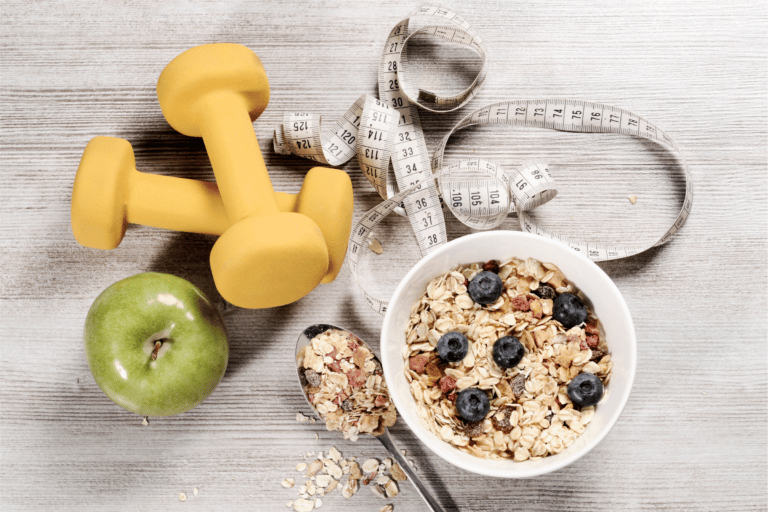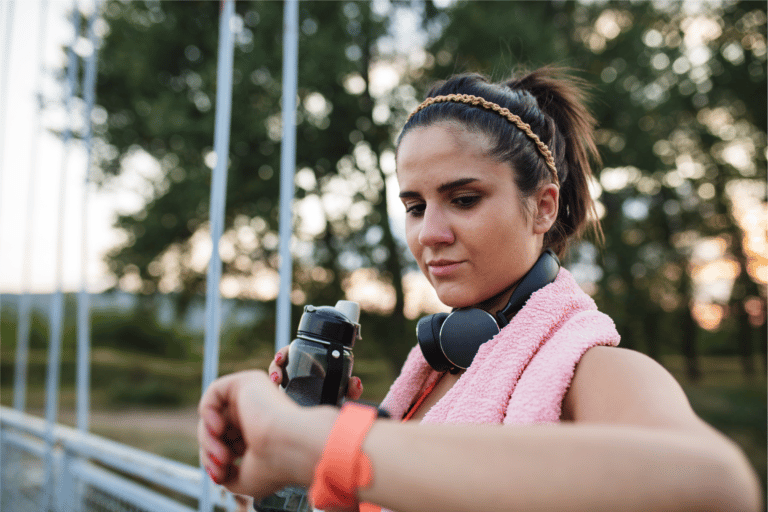Why Do Runners Get So Skinny? (The Good and the Bad)
Running is a popular exercise that many people take up in order to slim down their waistline. Whether it’s the most enjoyable form of exercise or it just burns the most fat, running is a classic weight loss strategy.
Running has the propensity to make people skinny; they lose fat and often muscle when running. Why is that?
Runners get so skinny because they burn many calories when they work out. Over time, the body adapts and maintains this thin build because skinny runners enjoy improved running efficiency through an improved VO2 max and a lighter load on the joints. Additionally, runners train slow-twitch muscle fibers that are naturally lean and smaller muscle mass.
Read on to learn the reasons behind why runners become skinny, whether running directly makes you skinny, and if all runners end up slim!
Reasons why runners get so skinny
If you’ve ever watched the Olympic distance runners or a race like the Boston Marathon, you probably noted how skinny the runners were.
Seeing these runners can actually be a bit disconcerting. To the naked human eye, they are nothing but skin and bones. However, upon further inspection, they are perfectly built for the sport of running.
Why and how do they get so skinny? Here are four reasons why runners get so skinny.
- Training plan
- Efficient muscles
- Healthy eating
- Genetic predisposition
Training plan
Running is no small task. Running a marathon, half-marathon, or even something as short as a 5k can be quite taxing depending on the individual and their fitness level.
Depending on the objective, training plans can be demanding on the human body, hence why runners end up so skinny.
Runners get skinny because they execute grueling workouts frequently. Runners often run multiple times a week for long distances at a time; this burns many calories and runners do not eat enough calories to maintain their weight.
While the number of calories you burn during a run varies due to genetic and physiological factors, the golden standard is to burn about 100 calories every mile you run.
Examining the training schedule of a long-distance runner reveals a large part of why they are so skinny: they run lots of miles! Elite runners run up to 100 miles every week.
Taking this into consideration, 100 miles multiplied by 100 calories, an elite runner can burn up to 10,000 calories a week in addition to their basal metabolic rate!
Eating enough calories to cover this difference is a real challenge; many runners cannot meet the mark, so they lose weight and become very skinny.
On top of this, the length of long-distance workouts results in the burning of glycogen to the point where runners use all their reserves. Once glycogen has been used, the body uses fat as its secondary energy source.
Inspected from that angle, long-distance running literally burns fat!
However, fear not, for this is actually a good thing! The next reason runners are skinny helps to explain why being a skinny runner is one of the greatest advantages a runner can have.
Efficient muscles
Runners often appear to have no muscle, or so you may think. Realistically, runners simply have extremely lean muscle mass that is efficient for running.
By having lean muscles, runners do not have to expend as much energy as if they had larger muscles. While many deem larger muscles aesthetically pleasing, they constitute unnecessary weight for runners to carry. Their bodies are much more efficient when skinny.
Runners end up skinny from the nature of their training, but it just so happens that this makes them more effective runners. It’s more efficient to be skinny; the body knows this!
Broadly speaking, there are two types of muscle fibers: slow-twitch and fast-twitch.
Slow-twitch muscle fibers are activated in slower, endurance-based activities like running, biking, swimming, etc. Fast-twitch fibers are better for bursts of speed, such as in football, sprinting, etc.
Long-distance runners train their slow-twitch muscle fibers, not so much the fast-twitch fibers. Slow-twitch fibers are smaller compared to fast-twitch fibers. Hence the reason runners end up with lean rather than bulky muscles.
Skinny runners then enjoy performance advantages; running as a skinny individual is easier on the joints than if overweight. The joints do not endure as much stress with less weight to carry around.
Lighter runners also enjoy an improved VO2 max, which means that they utilize oxygen more efficiently. This is crucial for endurance running because muscles require large quantities of oxygen during aerobic exercise.
Healthy eating
We’ve all heard the saying that a six-pack is made in the kitchen, not the gym. The same goes for running: if you want to lose weight, you need to eat clean.
Many runners are skinny because they eat healthy foods, subsequently expending more calories than they consume. Eating healthy, nutritious whole foods is often less calorically dense than processed foods, making it easier to consume fewer calories and lose weight.
Developing healthy eating patterns is a key part of becoming a proficient runner. To properly fuel the body for runs, runners must eat clean and give their bodies the necessary nutrients.
Eating healthy does two things: it helps decrease hunger while the food itself is low in total calories.
By pairing whole grains with fruits, vegetables, and proteins, runners will likely remain full for much longer than those who consume highly processed food. A study performed by Harvard shows that individuals who consume a diet similar to this actually lose 0.4 pounds a year.
Similarly, individuals who eat unprocessed diets eat filling foods that are low in calories. Over time, the effect compounds and unprocessed diets lead to weight loss, while ultra-processed diets basically promise weight gain.
Genetic predisposition
While hard work often trumps talent, it is true that some people are blessed with innate talent. The most elite runners in the world often have genetic predispositions to skinny frames.
Many runners have genetic predispositions to be skinny. Being born with a low body mass index gives runners an innate advantage by making their bodies more efficient.
One look at Kenyan runners will explain the genetic predisposition for runners to be skinny perfectly.
For starters, Kenyan runners have dominated long-distance races over the past couple of decades. Many of the Boston Marathon’s winners come from Kenya, both male and female competitors.
The question is, why are Kenyan runners so elite? They happen to have a genetic predisposition to a favorable running build.
Kenyan runners are born with less mass and lean muscles, which is perfect for running. While this is not the only factor contributing to the success of Kenyan runners, it is a very telling attribute.
This is why when we see elite runners, they are often super skinny; it turns out they were born that way! From this light, instead of running making you skinny, it appears that skinny people become runners because they naturally excel at the sport.
Does running make you skinny?
There are many reasons runners are skinny: they may be born that way, run a high volume, or just eat really clean.
At the center of the reasons is one question: does running itself make you skinny?
No, running does not make you skinny by itself. While runners often lose weight, this is not merely a result of running but of being in a caloric deficit. Expending more calories than you consume is how runners become skinny; runners simply burn lots of calories, so consuming enough calories to maintain weight can be challenging.
I think it’s important to clarify the question in this situation: does running on its own make you skinny? The answer is a resounding no. Is running likely to contribute to weight loss? Absolutely!
Weight loss is simple and often overcomplicated: it’s calories in versus calories out. To lose weight, all you need to do is put yourself in a calorie deficit. Expend more calories than you consume.
However, running is often a large contributor to creating a calorie deficit. Running burns tons of calories; as mentioned before, while the amount of calories you burn depends on your body weight and intensity, expect to burn around 100 calories per mile.
Best put, running can make you skinny if running frequently and used in tandem with healthy eating practices. If you want to keep some muscle on, lift weights and eat enough calories to maintain weight.
P.S. you should lift weights either way! There are many benefits for runners besides looking muscular.
Are all marathon runners skinny?
For those aspiring to one day tackle a marathon, it may be discouraging to watch elite marathoners and to see that they are all skinny. Are all marathoners skinny, or are elite marathon runners more likely to be skinny as a result of their training?
No, not all marathon runners are skinny. While elite marathon runners are almost always skinny, anybody can run a marathon! Whether you’re skinny, average, overweight, or super muscular, you can run a marathon if you put your mind to it.
Elite marathon runners are in a league of their own. They often log 100 miles a week, running twice a day just to get all their miles in.
Running so often has a tendency to burn high amounts of calories. Eating to replenish 100 miles of running is incredibly hard, so elite marathoners are nearly always skinny!
Being skinny also gives marathon runners an advantage by having less body weight. Essentially, a runner who weighs more must expend more energy to keep pace with a runner who weighs less.
Simply stated, marathon runners follow a positive feedback loop: they run so much that they get skinny, and then they excel at running partially because of how skinny they are.
However, if you aren’t the skinniest of the bunch, do not fret! Anybody can run a marathon.
Running a marathon is about determination, not the build of your body. Julie Creffield serves as a perfect example.
In 2014, Creffield was considered clinically obese, but that didn’t stop her. She completed a marathon and changed the perceptions of many! You can read more about her story on the Huffington Post.
Do runners always have thin bodies?
Seeing skinny runners can be encouraging for runners looking to lose weight and get in shape. Are runners always skinny, or did they become skinny through running?
While elite runners are often born skinny, runners certainly do not always have thin bodies. Not only do runners run for different purposes, but all runners are at different stages in their running journey. However, as runners progress in their running, they are more likely to lose weight and become skinny.
Having a skinny build boils down to one key factor: a caloric deficit. When you burn more calories than you consume, weight loss is scientifically guaranteed.
Running is a medium to high-intensity sport that burns more calories than most other physical activities. Over time, runners cannot consume enough calories to keep up with this high caloric expenditure.
Typically, runners with thin bodies also follow healthy diets. If runners do not follow healthy diets, they are less likely to be skinny as they will be consuming more calories than necessary; this is known as a caloric surplus and leads to weight gain.
The best diet for runners and nearly all individuals is one full of nutritious whole foods. Eat lots of fruits and vegetables, lean protein, healthy fats, and complex carbohydrates!
Combining a high-volume training plan with a healthy diet explains why runners are always so skinny, however, not all runners are extremely lean.
Take, for example, Latoya Shauntay Snell, who ran 10 marathons in one year, along with a couple of 50ks in her past. She runs way more than most, and she isn’t skinny.
Keep in mind, however, that skinny and healthy are by no means synonymous. She simply eats enough calories to maintain her weight.






